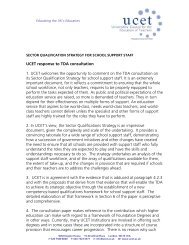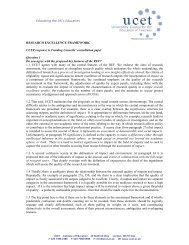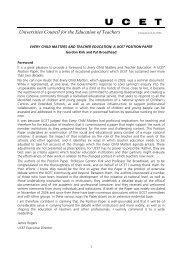The School Curriculum Ten Years Hence - UCET: Universities ...
The School Curriculum Ten Years Hence - UCET: Universities ...
The School Curriculum Ten Years Hence - UCET: Universities ...
Create successful ePaper yourself
Turn your PDF publications into a flip-book with our unique Google optimized e-Paper software.
<strong>The</strong> research predicts that such a profile leads almost certainly to<br />
long-term unemployment at age 18. In this initiative only 20% were<br />
unemployed at 18, the others re-engaged with education or training<br />
or found employment. <strong>The</strong> provision in this community is certainly<br />
making a difference!<br />
To complete this list of examples:<br />
• <strong>The</strong> first three people to attain the European Computer Driving<br />
Licence in Northern Ireland were students who had left the formal<br />
system and were re-engaged in education through a community<br />
initiative - an initiative, by the way, with no funding from the public<br />
service.<br />
I agree with Susan’s analysis and, like others today, Northern<br />
Ireland is able to provide examples of good practice. <strong>The</strong> good<br />
practice is set within our policies of:<br />
• <strong>The</strong> school improvement programme - support for all schools in NI<br />
• <strong>The</strong> school support programme - intensive support for some<br />
schools<br />
• Group One schools - a handful of schools existing in areas of<br />
multiple deprivation and which have experienced a period of longterm<br />
civiI unrest<br />
<strong>The</strong>se programmes are well funded and have made a difference to<br />
the quality of provision and standards being achieved. Nevertheless,<br />
we have a distance to travel before we can be content with the<br />
provision for all. Like Susan, I am not satisfied with the current<br />
response to social inclusion, which may be characterised as too<br />
often being:<br />
• Ad hoc and reflecting the excellent provision in some but not all<br />
schools, colleges and youth centres.<br />
• An approach in terms of general discipline and not a supportive<br />
individual pastoral programme.<br />
• A short-term funding issue to deal with a problem of remediation,<br />
as opposed to an integral aspect of the education system which<br />
demands early and sensitive intervention, supported by adequate<br />
funding and teacher training and development. Those of us who<br />
have worked in such areas know only too well the demands on<br />
teachers and others.<br />
What therefore would I like to see and what are the implications for<br />
the education system in general and for teacher education in<br />
particular? In general terms there need to be:<br />
• Acceptance of the need for alternative provision within the<br />
mainstream education (education, not school) system. We need to






